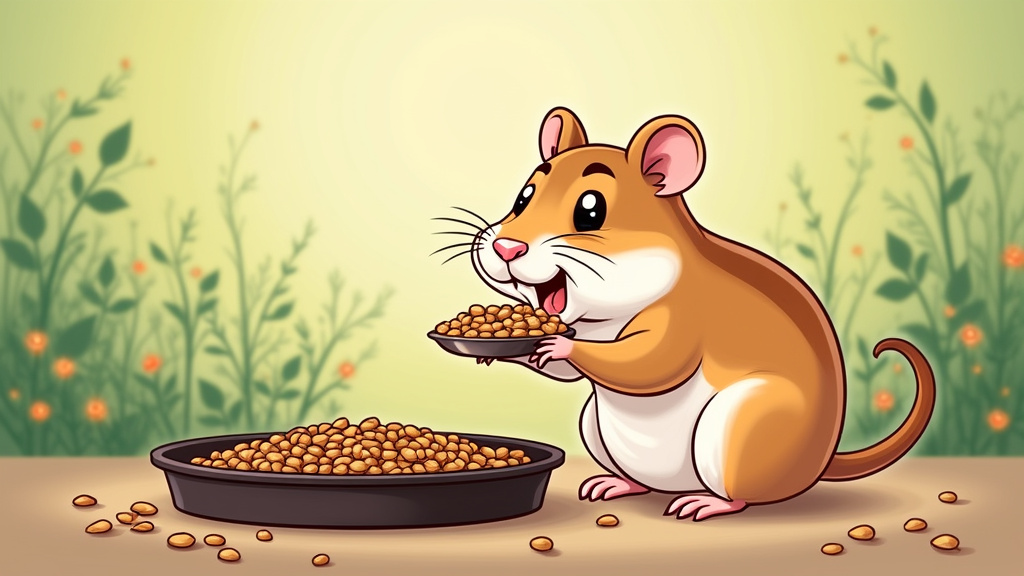Can hamsters eat bird food? It’s a question that often crosses the minds of curious hamster owners, especially when looking for variety in their pet’s diet. After all, bird food is easily available and packed with seeds that hamsters seem to enjoy. But just because something looks similar doesn’t always mean it’s suitable. While hamsters can eat bird food, there are important nutritional factors to weigh before offering it as a treat or part of their diet.
In this blog, we’ll explore whether bird food is a good option for hamsters, what to watch out for, and how to ensure your furry friend stays healthy and happy.
Understanding Hamsters’ Nutritional Needs
Hamsters are opportunistic omnivores, meaning they thrive on a diet that includes a wide range of nutrients from both plant and animal sources. In the wild, they eat seeds, grains, insects, and even small animals, which helps them meet their complex dietary needs. In captivity, it’s essential to replicate this balance to keep them active and healthy.
Essential Macronutrients:
- Protein: Hamsters need a diet that contains about 17-23% protein. This helps with muscle maintenance, growth, and overall body function.
- Fat: Their fat intake should be relatively low, around 3-5%, to prevent obesity while still providing enough energy.
- Fiber: Fiber plays a key role in digestion and should make up about 6-8% of their diet.
Commercial hamster pellets or lab blocks are designed to meet these precise requirements. They offer a balanced mix of these macronutrients, ensuring that your hamster gets everything it needs in the right proportions. This is why they are recommended as the primary food source, as they help avoid the nutritional imbalances that can arise from feeding them too many treats like bird food.
Can Hamsters Eat Bird Food?
Yes, but with Caution:
Hamsters can eat bird food, but it should be treated as an occasional snack rather than a staple in their diet. Bird food, especially seed-based mixes, can be appealing to hamsters because of its variety and taste. However, it lacks the balanced nutrition that hamsters need to stay healthy. While bird food offers some of the proteins and fats found in seeds, it often misses key nutrients like fiber, which is crucial for a hamster’s digestion, and specific vitamins that are vital to their overall well-being.
Hamster-specific food, such as commercial pellets or lab blocks, is carefully formulated to meet their unique dietary requirements, ensuring they get the right blend of protein, fat, and fiber. In contrast, bird food is created for avian nutritional needs, which are different from what a hamster requires. Offering bird food as an occasional treat is fine, but it should never replace their primary diet.
Nutritional Considerations for Bird Food
High Fat Content:
One of the main concerns with bird food is its high fat content. Seeds like sunflower and pumpkin seeds, which are common in bird mixes, contain significant amounts of fat. While fat is an important energy source for hamsters, too much of it can quickly lead to obesity and related health issues. Over time, a diet rich in fatty seeds can affect your hamster’s mobility and overall health, which is why moderation is essential when offering bird food.
Nutritional Imbalance:
Bird food, while high in fats and sometimes protein, doesn’t provide the complete range of nutrients a hamster needs. It often lacks enough fiber, which is important for keeping their digestive system functioning properly. Additionally, bird food may not include certain vitamins and minerals that hamsters need, such as Vitamin A and E, which are crucial for their immune system and skin health. For these reasons, bird food should only be used as a supplementary treat, never as a replacement for a balanced hamster-specific diet.
Best Practices for Offering Bird Food to Hamsters
Moderation:
When it comes to feeding bird food to hamsters, moderation is key. A small amount, offered occasionally, can be a fun treat for your hamster. Think of bird food as a special snack rather than something to be incorporated into their daily meals. A small handful of mixed seeds every few days is enough to provide variety without risking overfeeding or nutritional imbalances.
Check Ingredients:
Before offering bird food, it’s important to carefully check the ingredients. Some bird food mixes may contain harmful additives, artificial preservatives, or high-sugar ingredients that are not suitable for hamsters. Avoid any mixes that include these components, as they can lead to health issues over time. Always opt for natural, additive-free options, focusing on seeds that are safe for hamsters.
Complementary Treats:
Bird food can serve as a great way to enrich your hamster’s environment by stimulating their natural foraging instincts. Use it as a complementary treat to their main diet of commercial pellets or lab blocks. Scatter the seeds around their cage or hide them in different places to encourage mental stimulation and physical activity. However, remember that bird food should only be a supplement, never a replacement, for their primary, nutritionally balanced diet.
Conclusion
In summary, bird food can be a fun and enriching occasional treat for hamsters, but it should always be offered in moderation. The high fat content and lack of essential nutrients mean it can’t replace their primary food source. By keeping their diet balanced and offering bird food sparingly, you can ensure your hamster stays healthy and happy.
Always prioritize their nutritional needs by sticking to hamster-specific food and using bird food as a supplementary, fun addition to their diet. A balanced approach is key to maintaining their overall well-being!

